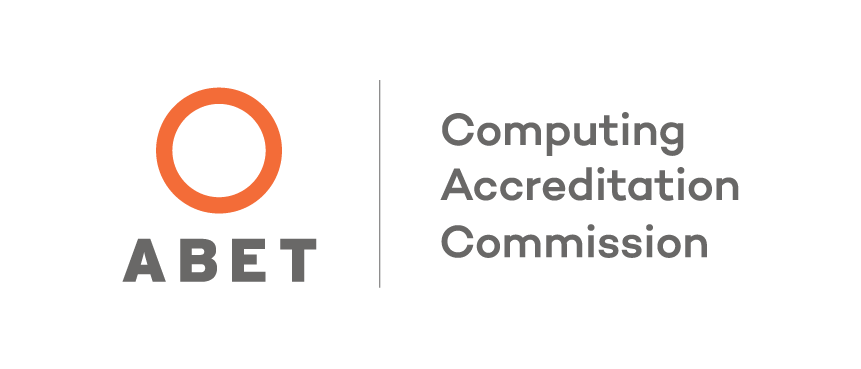Computer Science BS, Computer Science MS 4 Plus 1 Program (Metro)

The Lee Gildart and Oswald Haase School of Computer Sciences and Engineering (GHSCSE) offers a 4 Plus 1 program that allows qualified students to obtain a Bachelor of Science (BS) in computer science degree. In particular, three graduate courses: CSCI6603 Computer Architecture (3 credits), CSCI6623 Database Systems (3 credits) and CSCI6638 Operating Systems (3 credits), when successfully completed under the 4 Plus 1 program, can be credited toward both the BS and the MS degrees. This program is offered by GHSCSE at the Metropolitan Campus, Teaneck, New Jersey. The BS in computer science program is accredited by the Computing Accreditation Commission of ABET. This accreditation applies only to the BS in computer science program offered by the GHSCSE at the Metropolitan Campus.
Students in the BS in computer science program must take one of the three concentrations:
- Big Data Analytics
- Cybersecurity and Information Assurance
- Game and Mobile Application Development.
Students completing the BS in computer science program with a concentration in cybersecurity and information assurance are eligible to receive a Certificate of Completion of a National Security Agency (NSA) and Department of Homeland Security (DHS)-designated CAE-CDE program of study from FDU’s Center for Cybersecurity and Information Assurance (CCIA). CAE-CDE denotes the Center for Academic Excellence for Cyber Defense Education.
Professional Accreditation

The B.S. in Computer Science program is accredited by the CAC of ABET, https://www.abet.org.
Degree Plan
1st Semester (14 credits)
- CSCI1201 Computer Programming I
- WRIT1002 Composition I: Rhetoric & Inquiry
- MATH1201 Calculus I
- UNIV1001 Transitioning to University Life
- ENGR2286 Digital System Design
2nd Semester (14 credits)
- CSCI1202 Computer Programming II
- CSCI2215 Introduction to Computer Science
- WRIT1003 Composition II: Research & Argument
- MATH2202 Calculus II
- UNIV1002 Preparing for Professional Life
3rd Semester (16 credits)
- CSCI2234 Data Structures and Algorithms
- CSCI2247 Assembly Language Programming
- PHYS2201 University Physics 1 Lab
- PHYS2203 University Physics 1 Lecture
- UNIV2001 Cross-cultural Perspectives
- ENGR2210 Technical Communication
4th Semester (16 credits)
- CSCI6623 Database Systems
- MATH3237 Probability and Statistics I
- PHYS2204 University Physics II Lecture
- PHYS2202 University Physics II Lab
- UNIV2002 Global Issues
- CSCI2235 Survey of Computing Security
5th Semester (15 credits)
- CSCI3240 Computer Networks
- MATH2255 Discrete Structures
- CSCI6638 Operating Systems
- ENGR3000 Modern Tech: Principles, App, and Impacts
- Humanities elective
6th Semester (15 credits)
7th Semester (16 credits)
- Concentration
- Technical electives (6 credits)
- CSCI4384 Prep for senior project
- ENGR4210 Managerial and Economic Analysis
- CSCI6603 Computer Architecture (These courses can be applied to the M.S. degree provided that the student earns a grade of B or better)
8th Semester (14 credits)
- Concentration (6 credits)
- Technical elective
- CSCI3260 Mathematical Foundations of Computer Science
- CSCI4386 CS Senior Project
Concentrations
Students must complete any one of three concentration areas: Cybersecurity and Information Assurance, Big Data and Analytics, Mobile and Game App Development. Each concentration requires the successful completion of six courses (15 credits).
Cybersecurity and Information Assurance
Required Courses (15 credits)
- CSCI3274 Linux System Administration (3 credits)
- CSCI3345 Firewalls and Intrusion Detection Systems (3 credits)
- CSCI3410 Foundations of Cybersecurity (3 credits)
- CSCI3420 Cryptography (3 credits)
- CSCI3783 Information Security (3 credits
Students completing the BS in Computer Science with this concentration are eligible to receive a Certificate of Completion of a NSA & DHS designated CAE-CDE program of study from FDU’s Center for Cybersecurity and Information Assurance (CCIA).
Game and Mobile App Development
- CSCI3314 Mobile Application Development (3 credits)
- CSCI3317 Computer Game Programming (3 credits)
- CSCI3444 Programming for the Internet
- CSCI3385 Artificial Intelligence
-
CSCI3387 Machine Learning
